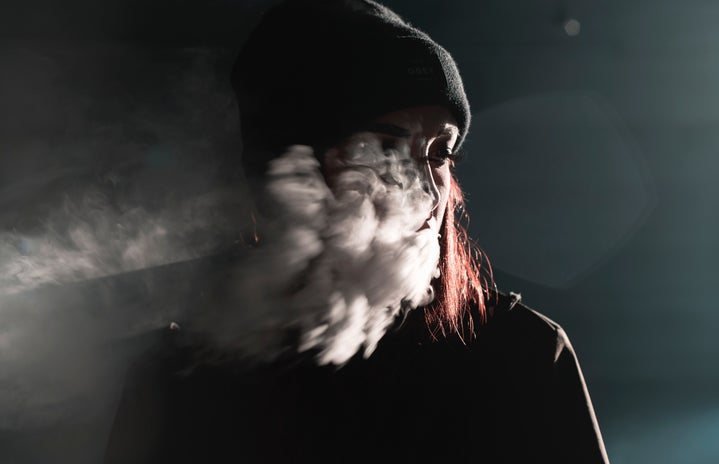The term Manic Pixie Dream Girl (MPDG) has been floating the media sphere and my Tumblr dashboard since I was old enough to follow feminist accounts. It was originally coined by Nathan Rabban in a 2005 film review of Elizabethtown. He describes the trope by saying, “The Manic Pixie Dream Girl exists solely in the fevered imaginations of sensitive writer-directors to teach broodingly soulful young men to embrace life and its infinite mysteries and adventures.” It usually takes a white, able-bodied, slender, and beautiful woman to show a depressed or bored male protagonist the beauties of this world. She doesn’t have much characterization outside of being “quirky” and serving the male protagonist. This trope has much of its foundation in the male gaze, as the entire viewpoint is through the male lead idealizing a woman as a savior. It grows in harm when it jumps off our movie screens and into our Tinder messages.
As mentioned above, the MPDG is characterized by her quirkiness. Much of her erratic behavior, impulsivity, and hyperactivity are written off as “quirky” and making her “special.” The romanticization of this type of behavior is exceedingly toxic to the young men and women that engage with this media, and especially those that are dealing with mental health issues.
The relationship that this trope has to mental illness is difficult to separate. The majority of the female characters that are created as one-dimensional manic pixies could show various symptoms of mental illness if you look just a little beyond the surface. Instead of depicting the reality of mental illness, their illness is instead sexualized and painted as desirable to the audience. An example of this is within the film Garden State, where Natalie Portman’s character, Sam, is a pathological liar. This condition is depicted as a cute quirk for her character to have and is never really delved into beyond a basic level.
In pieces of work where the Manic Pixie is directly depicted as mentally ill, her illness is often used as a plot device to make her more “deep,” “poetic,” or “beautiful.” It’s again utilized as a method to make her special and “different than the other girls.” Her sadness gives her a different and new perspective on life, and the fact that she’s so misunderstood is attractive. An example of this is Looking for Alaska by John Green, where the titular character, Alaska, is increasingly erratic, impulsive, and drinks and smokes frequently – but it’s all showcased within the male gaze to make her seem exciting and sexualized.
Jen Yakabuski, a first-year Ryerson student opened up about her experiences in terms of being the Manic Pixie within relationships.
“Most of my relationships have made me vulnerable and open but have ended with me staying in a stagnant position or feeling used as someone’s own plot point,” she says. “Their instability attracted my own instability but almost as if my mental illness was entertaining or something to keep it interesting. I felt obliged to be a savior to them, and in the same sense a Manic Pixie Dream Girl.”
“I think if I was not mentally ill I would not be objectified as much and not seen as such an easy target to be manipulated,” Yakabuski says of her borderline personality disorder. “We are expected to help these men be better, without being given the same support, and are treated as a fetishization.”
She says characters like Ramona from Scott Pilgrim vs. The World, who many believe to possibly have bipolar disorder, are only given this mental illness to propel the plot forward without focusing on this specific character’s growth and wellbeing.
Yakabuski however isn’t the only one who had felt forced in the role of an MPDG because of her mental health. Wanda Deglane, a 20-year-old from Phoenix echoed the same sentiment.
“My anxiety and depression were just cutesy things about me,” Deglane says. Her mental illness is often characterized as quirky, along with how she withdraws from people close to her, she says.
“I’ve definitely been put on a pedestal before, where my ex just assumed that with only ‘my love’ he’d get better from his depression and anxiety, and all his unhealthy or harmful habits would just naturally go away because he was with me,” she says. “He never wanted to really put in the work of dealing with his mental illness because he assumed I’d never leave his side or stop supporting him, no matter how bad he got. It definitely messed with my self-concept.”
The MPDG effectively forces women into the archetype of the nurturer and confines them to that role.
The toxicity of the Manic Pixie Dream Girl trope in the real world isn’t exclusive to females. The majority of the male protagonists in MPDG films are dealing with some form of mental illness. Look at Zach Braff in Garden State or Orlando Bloom in Elizabethtown, for example. They are two men that are bored of their mundane lives and mentally unwell until they meet the MPDG. She shakes up their lives and makes them feel happy and alive again. It sends home a message to young men that there is someone that will save you from your mental illness, which is a toxic and untrue message. One individuals support cannot act in place of seeking actual help.
Kaitlyn Joy, an 18-year-old from Florida had an experience in high school where a male classmate told her peers that she would fix his depression and he was in love with her. She believes that the portrayal of MPDG in media reinforces that type of message.
When we stop viewing people as individuals but instead idealized concepts it can be incredibly harmful to the person that we are objectifying.
Eli Savage, Ryerson RTA student says he used to believe this media trope until they became the MPDG themselves. “Someone messaged me first on Tinder saying ‘please ruin my life.’ I at first found it funny because I had said the same thing to people before. But thinking about it more made me realize how uncomfortable it is for someone else to see you like that.”
Clementine Kruzinsky from The Eternal Sunshine of the Spotless Mind couldn’t have summed up our feelings better than when she said, “Too many guys think I’m a concept, or I complete them, or I’m gonna make them alive. But I’m just a fucked-up girl who’s looking for my own peace of mind. Don’t assign me yours.”



